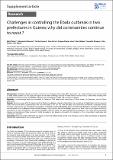Challenges in Controlling the Ebola Outbreak in Two Prefectures in Guinea: Why Did Communities Continue to Resist?
View/
Publication Date
2015-10-11Type
Article, Journalviews
downloads
Metadata
Show full item recordCitation
Sylla Thiam, Alexandre Delamou, Soriba Camara, Jane Carter, Eugene Kaman Lama, Bara Ndiaye, Josephat Nyagero, John Nduba, Mor Ngom. Challenges in controlling the Ebola outbreak in two prefectures in guinea: why did communities continue to resist ?. Pan Afr Med J. 2015;22(Supp 1):22
Abstract/
Introduction: The Ebola outbreak emerged in a remote corner of Guinea in December 2013, and spread into Liberia and Sierra Leone in the context of weak health systems. In this paper, we report on the main challenges faced by frontline health services and by communities including their perceptions and views on the current Ebola response in the Prefectures of Coyah and Forecariah in Guinea. Methods: A cross-sectional study was conducted in December 2014 using mixed approaches: (i) Desk review; (ii) Interviews; and (iii) Direct observation. Results: Almost one year after the beginning of the Ebola virus disease outbreak in West Africa, the perceptions of stakeholders and the observed reality were that the level of preparedness in the two health districts was low. The study identified poor coordination mechanisms, inadequate training of human resources and lack of equipment and supplies to field teams and health facilities as key elements that affected the response. The situation was worsened by the inadequate communication strategy, misconceptions around the disease, ignorance of local culture and customs and lack of involvement of local communities in the control strategies, within the context of poor socioeconomic development. As a result distrust developed between communities and those seeking to control the epidemic and largely contributed to the reluctance of the communities to participate and contribute to the effort. Conclusion: There is a need to rethink the way disease control interventions in the context of an emergency such as Ebola virus disease are designed, planned and implemented in low income countries.
Further Details
This is an Open Access article distributed under the terms of the Creative Commons Attribution License (http://creativecommons.org/licenses/by/2.0), which permits unrestricted use, distribution, and reproduction in any medium, provided the original work is properly cited
Publisher
Pan African Medical JournalISSN
1937-8688Collections
- General - GEN [367]

